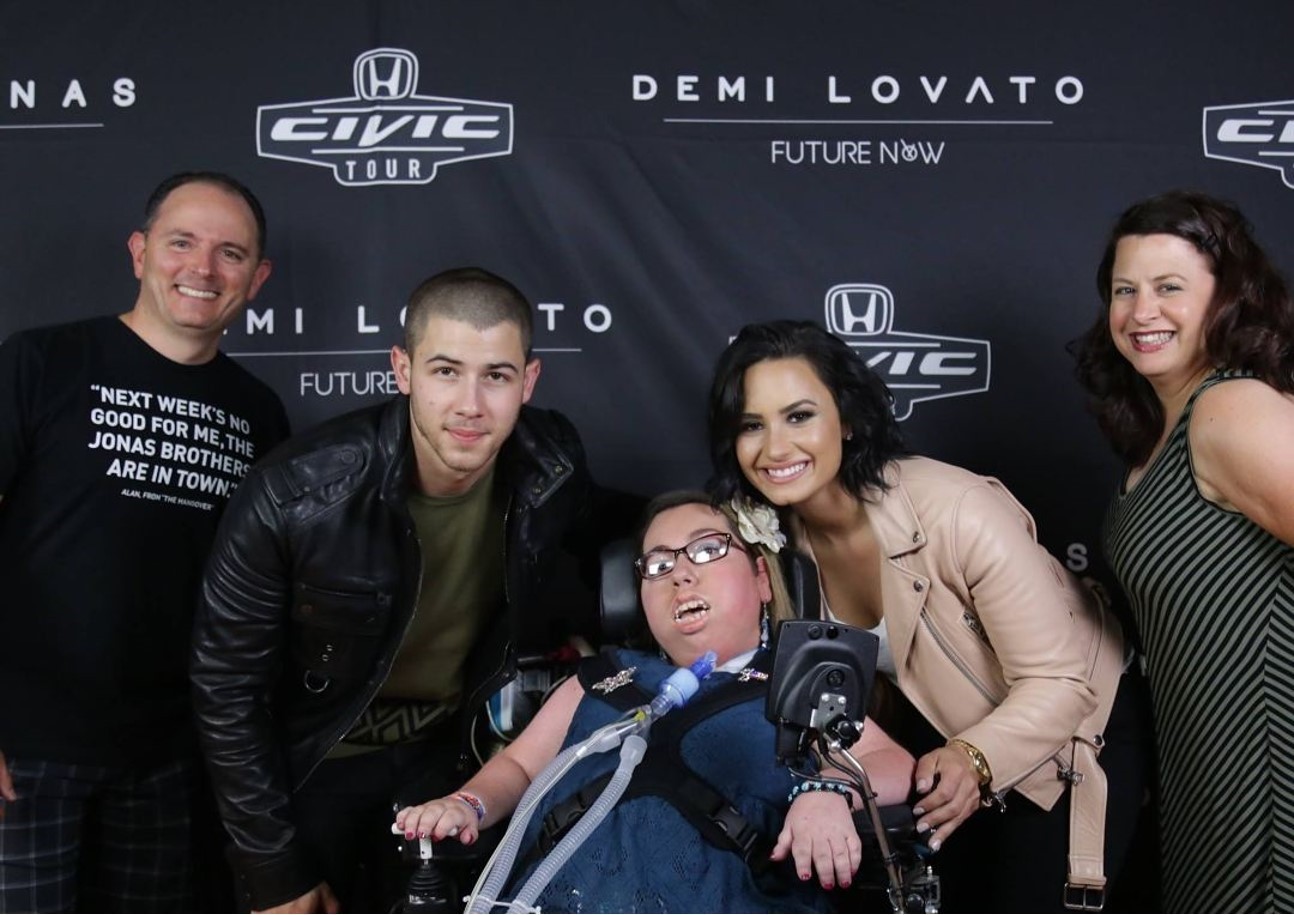Life with SMA Can Be Beautiful
By Jen Allen
 The Calise family, Michael, Corinna, and Michelle, with Nick Jonas and Demi Lovato
The Calise family, Michael, Corinna, and Michelle, with Nick Jonas and Demi Lovato
When Corinna Calise was diagnosed with spinal muscular atrophy (SMA) Type 1 over 20 years ago, hardly anyone knew about the genetic disorder, even the first neurologist who examined her.
Being a nurse, her mother Michelle knew something was wrong one day—at the age of seven or eight months—when she lifted Corinna’s leg, and it fell back down on the changing table.
After getting no answers from their beloved pediatrician and a local specialist, Michelle and her husband Michael persevered until they were able to see one of the top neurologists in Boston.
“We went in there and within seconds, he told us what she had. He said he could tell by her fasciculating tongue.” That means a twitching tongue, which is the calling card of a motor neuron disorder, specifically SMA.
SMA is rare, affecting one of 6,000 – 10,000 people born worldwide and about 10,000 – 25,000 individuals in the US. Most people with this genetic condition are diagnosed as babies, although less common types of SMA can be diagnosed into adulthood. There is a wide range of disease progressions, but to some extent, people with SMA experience increasingly impaired movement, muscle strength, and nervous system function.
“We were so surprised this was happening, because Corinna has always been the picture of health,” Michelle recalled. “The best advice the doctor gave us was don’t research this disease until we do a blood test and know for sure.”
“Once we got the results, 20 years ago, there was no treatment and no cure,” she exclaimed, noting that research has made amazing progress since then. “We decided to give Corinna the best life possible. We knew Corinna was here for a reason. Most of all for us, she teaches us that life is precious and to enjoy every single day.”
Meeting Corinna for the first time
At 21 years old, Corinna is a force to be reckoned with—in the most loving, positive sense. When you get together with her, even by video chat, the mood suddenly lifts, and conversation with her takes on a playful buoyancy. She’s the kind of fun, joking, charismatic person others want to be around.
The first thing I noticed about Corinna was her contagious laugh, which comes out a lot. Smiling is mandatory, whether it’s on the inside or the outside. She exudes kindness and enthusiasm for herself and for others. The next thing that got me was the way she wiggles her eyebrows at you. She may have lost some typical facial expressions, but her eyebrows speak volumes and make me laugh out loud.
Corinna also likes to follow the latest beauty products and is usually sporting a new makeup look—something she likes to talk about on Instagram. As she says @rarebycc, rare is beautiful.
Growing up rare
Corinna has always lived surrounded by the love of her parents, friends, and big extended family in the same hometown of Cranston, outside Providence, Rhode Island. They have three dogs at home, grandparents, aunts and uncles on both sides nearby, and every week someone takes turns hosting Sunday dinner for the whole family, Italian American style.
Even with their family support, Corinna has required regular skilled nursing care since she was two. As SMA gradually affected her ability to swallow and to breathe, Corinna received surgeries to accommodate a gastronomy tube, or g-tube (a tube inserted through the belly that brings fluid, nutrition, and medications to the stomach) and a tracheostomy tube, or trach (a breathing tube that connects the windpipe to a mechanical ventilator).
The nurses on Corinna’s BAYADA care team have been with her for a very long time: RN Cindy Marchetti (20 years), RN Cindy Griffin (ten years), RN Micaela Kyees (five years), and RN Clinical Manager Dina Orabona (five years). They accompany Corinna to school and provide her regular morning and evening nursing care which includes daily assessments, preventive care, respiratory treatments, pump feedings, transfers (using a barrier-free ceiling lift), maintenance of supplies and durable medical equipment, and trach and g-tube changes. They share in her hijinks, music, and celebrity sightings too, but more on that later.
One of Corinna’s earliest memories was the sense of independence she felt at the age of three, tooling around in her first power wheelchair. She mastered driving that chair quickly and has always been a fast learner. But making friends with peers at school was hard at first. “In elementary school I started to understand that I was different, because no one in my classes really looked like me,” Corinna recalled. “I thought other kids may be intimidated by me, so I was shy and frustrated, and didn’t talk much in school until the third grade.”
Her game changer at age ten was a back surgery for Corinna’s severe scoliosis (curvature of the spine), which had been preventing her from sitting up in her chair for long stretches. That used to mean she could only attend part of each school day. “The surgery improved my quality of life so much. I stopped getting frequent lung infections and got sick a lot less. It gave me the confidence to make friends and start to participate in after-school activities.”
The blossoming years
“Back surgery felt like a second chance for me,” Corinna said. Soon she was expressing herself and her love of music in the school choir. She started to really enjoy classes, making friends, and going out on dates with boyfriends. Her love of school dances began in middle school, attending every chance she could through high school prom. Junior year, she became technology-independent with a new eye gaze-controlled tablet. Corinna became one of the founding members of her high school’s unified cheerleading team, and everyone knew who she was.
When Cindy accompanied Corinna up the ramp to receive her high school diploma, the whole auditorium of 400 classmates erupted into a standing ovation.
Realizations
“When I was younger, I had a more negative attitude toward myself as a disabled person. But as I’ve gotten older, I realized the power of a great story, and that the way I live my life is unique and special,” Corinna shared. “Seeing more representation of disabled people in the media inspired me to create my Instagram and help others live life to the fullest and not be ashamed of who they are.”
“My advice to other young people growing up with similar challenges would be to always advocate and stick up for yourself the best you can, with your family’s help if needed,” said Corinna. “Make your own decisions and do what’s best for you. As long as you’re working toward a goal, it’s okay if you don’t know where you are or where you want to go in life.”
Personal decisions, no regrets
Corinna’s personal goal right now is working toward her bachelor’s degree at Rhode Island College. And she’s also a travel bug. Rather than trying invasive new therapies, the Calises prefer to enjoy their annual RV vacations to places like Disney World, Nashville, Boston, and Niagra Falls. Unfortunately, their trip to New York City had to be postponed this year due to COVID-19.
In simpler times before the pandemic, Corinna also enjoyed running around with nurses and friends seeing movies, events, and live shows. She has a mysterious knack for drawing people to her and meeting celebrities, whether it’s backstage at a concert or as an onlooker when a movie’s filming nearby.
“We’re just happy that we’re all together and healthy,” Michelle stated, smiling emotionally at her daughter. ”We’re grateful we have amazing nurses who are our family. We are very, very lucky and blessed, and Corinna brought us that. Corinna shows us the way. Every day I say, ‘Good morning, how are you?,’ and Corinna says, ‘I’m amazing.’”
“Many years ago, we had a roomful of doctors and nurses giving us other advice,” Michelle reflected. “But the friends and nurses I know best said, do what your instincts are telling you. And we’re so glad we did. The people who stick with you on this journey are worth their weight in gold.”
